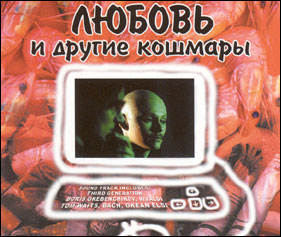Love and Other Nightmares [Ljubov’ i drugie kosmary]. Dir. Andrej Nekrasov (Russia, 2001)
Apart from the pun in the title (in Russian lyubov means love, but it’s also a woman’s name), some will admire the mega metafilmic framework of this film, while others may be irritated by its contortions.
The metafilm collides with a sci-fi plot. Alex, the only male character, is conducting an experiment in videoed dream-projection. He is consistently behind the camera: a modern entrepreneur in New Russia who speaks English with a Russian accent, he sets out to recruit women to dream about.
Women provide the material of both Alex’s experiment and the film itself, from the Western nightclub girl or business woman to the hardened Russian killer Ljuba or the alchoholic cronies in a seedy Russian café.
Being in Alex’s dreams involves having a personal relationship with him. The characters address and plead with the camera as their partner.
Like Nekrasov’s fascinating debut film Love is as Strong as Death (1996) this new film about Love could be thought tacky, with its mixture of guns and sex, its series of women in orgasm (at least five, heterosexually, homosexually and self-induced!). Orgasm is always accompanied by death – that is, not the little but the big death!
But give this film a chance and it transcends both the meta-framework and the emphasis on sex and violence to give pictures, scenes, characters and an intriguing sound-track which combine to achieve extraordinary poignancy.
Through the dream-machine set-up with its association to a hyper-modern and Western money-making world, the film moves in to capture its main heroine, the killer Ljuba, with her wracked face in exquisite close-ups; Ljuba’s femininity, her life-and-living-arrangements put the glamour-bedecked equivalent of Western women to shame, bringing pathos to her Russian predicament.
This is backed up by heart wrenching sequences-many of them lasting only a few seconds-of Petersburg exteriors, weaving corn and the recurring image of a small girl throwing atumn leaves in the air as she stumbles, in slow motion, down a large outdoor staircase.
These are not dreams caught on the experimental video-screen, but the memories and longings of those who are the victims of today’s Russia. Ljuba’s life is a nightmare in which love and death are inextricably bound together. Russia, in trying to be part of the flashy Western world, exposes its women to humiliation and despair.
This film is rich and sure in its use of cinema technique; from the Dogma-style hand camera chasing a desparate Ljuba, riling at the camera as she flees through a Petersburg courtyard, to the structured montage alternation between Ljuba’s abortion in a shabby Russian clinic and Alex’ simultaneous persuit abroad of new chique,English-speaking female subject-matter for his dream projections.
Semantically and aesthetically suggestive is the use of colour which does not simply move back and forth between color and black-and-white but which ”glides” imperceptibly between them.
Emotional poignancy is enhanced by the intricate musical soundtrack, ranging from traditional Russian folk songs, Soviet songs, jaunty contemporary Russian rock, Shalyapin singing Massenet’s Elegy, and to Tom Waits.




